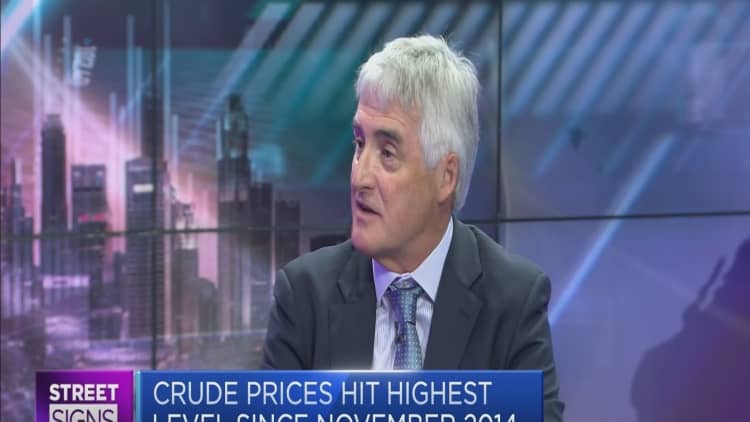
As oil proves resilient around 2014 highs, experts warn that a sustained uptick in energy prices could upset market sentiment in Asia.
Higher oil prices combined with rising U.S. interest rates could prove "a double whammy," for the region, "adding about a trillion dollars a year to the import bill across Asia," Richard Martin of advisory firm IMA Asia told CNBC on Friday.
That hefty tab is set to grow this year beyond the $1 trillion mark, according to analysis from Thomson Reuters, which shows that the Asia-Pacific region already consumes more than 35 percent of the 100 million barrels of oil the world uses each day.
At the same time, that same Asia-Pacific region, as defined by Thomson Reuters, is the world's smallest oil-producing area, accounting for less than 10 percent of output.
If oil leads to a quicker than expected uptick in inflation, that could build pressure on central banks to take a more aggressive stance on interest rates than the market anticipates.
As U.S. 10-year yields hold above 3 percent, several central banks in emerging markets have already hiked rates to avoid capital outflows and support their currencies. The Bank Indonesia is among those, moving this week to increase interest rates for the first time in four years.
According to Michael Spencer, chief economist for Asia Pacific at Deutsche Bank, the Bank Indonesia could just be getting started. "Those countries with current account deficits that have relied on fixed income capital inflows to finance those deficits — and that's Indonesia in spades — are going to find it more difficult," Spencer told CNBC this week.
What it means for oil exporter Malaysia
"Oil is a key risk for Asia as a whole, it sits quite distinct to other emerging market regions," Hamish Pepper, head of forex and emerging markets macros strategy research for Asia at Barclays, told CNBC.
Pepper said that Asia is still fairly well placed to outperform other regions, because of strong global growth this year, but he warned that "oil will be a spanner in the works for that story."
Even among Asia-Pacific's few oil-exporting countries, such as Malaysia, the rise in oil presents a double-edged sword for fiscal management. Newly elected Malaysian Prime Minister Mahathir Mohamad pledged to scrap an unpopular GST (Goods and Services Tax), and to offset lost revenue partly with the help of higher oil prices. However, Malaysia is still a net energy importer.
The Mahathir government has yet to commit to another campaign promise — to increase fuel subsidies to help ease the burden of higher energy prices on consumers. Many economists have warned of possible negative repercussions for Malaysia's fiscal balance and debt rating if that campaign pledge turns into policy.


